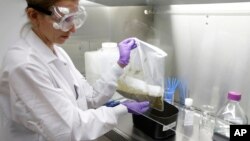Inflammatory bowel diseases, such as Crohn’s disease and ulcerative colitis, are extremely painful and can lead to colorectal cancer. Now, researchers have effectively cured the conditions in mice, offering hope for human sufferers of so-called IBDs.
Waste material from healthy people is rich in helpful bacteria. When transferred to the digestive tracts of sick individuals, in whom there is an overgrowth of bad bacteria, the fecal matter helps restore the balance of healthy flora.
Some cutting-edge doctors have used so-called fecal transplants to treat severe bacterial infections, including Clostridium difficile or C. diff, which releases toxins as it grows, attacking the lining of the intestines.
Scientists also have found the transplants appear to reverse autoimmune diseases of the bowel.
Crohn’s disease and ulcerative colitis, also known as inflammatory bowel disease or IBD, are life-long disorders that cause severe diarrhea, painful cramps and bleeding.
According to June Round, a professor of medicine at the University of Utah, such diseases are becoming increasingly common around the world, as more and more people eat a low-fiber, high-fat Western diet.
Round also blames the widespread use of antibiotics.
“So, I think a lot about the microbes that naturally reside in our bodies. And antibiotics can not distinguish between what is good and what is bad," she said. "They kind of wipe-out everything. So, there is a very clear-cut correlation between when Western civilization started using the antibiotics and the increased incidence of a lot of these autoimmune diseases.”
Currently, treatments for these conditions are supportive, designed only to ease the symptoms. So, the idea of a potential cure for IBD is very appealing.
In experiments with mice with inflammatory bowel disease, Round and her team found that fecal transplant restored the healthy balance of intestinal flora, returning the intestine to near normal.
But the notion of transferring fecal material from one person to another -- and in the case of mice, through a tube into the stomach -- makes many people say "yuck." So Round said researchers are now trying to identify the helpful bacteria in human waste so they can be put into pill form.
“You know, right now we have to do fecal transplantation because the [bacterial] communities are so complex, and we just do not know what organisms are doing the good thing," she said. "So, we just kind of put it all in there and hope for the best. So, there is no way of getting around it right now, but hopefully in the future there will be.”
The work is published in the journal Cell Host and Microbe.










